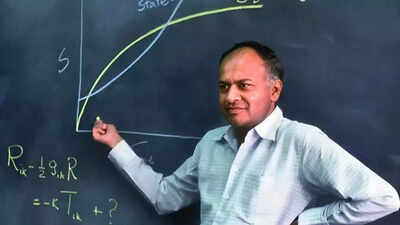Latest Education news – Board Exam Results, Admit Cards, Exam Paper Analysis and Question Papers | Times of India
From classrooms in Varanasi to reshaping ideas in cosmology, Jayant Narlikar‘s journey remains a shining example of scientific integrity and vision. Jayant Vishnu Narlikarwas born on July 19, 1938, in Kolhapur, Maharashtra, into a deeply academic household. His father, Vishnu Vasudev Narlikar, was a prominent mathematician and physicist, and a professor at Banaras Hindu University (BHU), while his mother, Sumati Narlikar, was a Sanskrit scholar.This early exposure to both science and classical knowledge laid a strong intellectual foundation for Jayant.Raised in Varanasi, Narlikar attended Central Hindu College (now Central Hindu Boys School), where he quickly developed a love for mathematics and the sciences. Encouraged by his academic surroundings, he pursued higher education at BHU, completing a Bachelor of Science in 1957. His growing interest in the mysteries of the universe led him to take the next major step: studying at the University of Cambridge, one of the world’s most prestigious institutions.
The Cambridge years: A turning point in scientific thought
At Cambridge, Narlikar joined Fitzwilliam College, following in his father’s footsteps. In 1959, he completed the Mathematical Tripos—a rigorous course in mathematics—earning a Bachelor of Arts in Mathematics. This was a period of intense intellectual development, but Narlikar’s biggest influence came from his mentor, the renowned British astronomer Fred Hoyle.Under Hoyle’s guidance, Narlikar began his doctoral research in theoretical cosmology. Their scientific collaboration would later lead to groundbreaking contributions in cosmology. During his doctoral studies, Narlikar won the Smith’s Prize in 1962, an award for exceptional work in theoretical physics.In 1963, he was awarded a PhD in cosmology. The following year, he earned a master’s degree in astronomy and astrophysics, also from Cambridge. He stayed on as a postdoctoral fellow at King’s College, and in 1966 became a founding member of the Institute of Theoretical Astronomy, established by Hoyle.
Rethinking the beginning of the universe
Jayant Narlikar and Fred Hoyle did not accept the widely supported Big Bang Theory as the only explanation for the origin of the universe. Instead, they co-developed the Hoyle–Narlikar theory of gravity, which introduced a different view: that the universe does not begin with a singular event, but instead experiences continuous creation of matter. This idea supported the steady-state model of the universe, which challenged the concept of a cosmic beginning.The Hoyle–Narlikar theory attempted to synthesise Einstein’s general relativity with Mach’s principle, a philosophical concept suggesting that the inertia of objects is influenced by the presence of all other mass in the universe. Though the theory was controversial, it opened new avenues of discussion and showed Narlikar’s willingness to explore ideas outside mainstream scientific consensus.His other research interests included quantum cosmology, action-at-a-distance physics, and other non-standard models of the universe, which reflect his deep commitment to critical thinking in science.
A vision for Indian science
Despite his growing success in the UK, Narlikar remained connected to India. In 1972, he returned to join the Tata Institute of Fundamental Research (TIFR) in Mumbai, where he led the theoretical astrophysics group. His return marked the beginning of a new phase: building India’s capacity in astrophysical research.In 1988, Narlikar became the founding director of the Inter-University Centre for Astronomy and Astrophysics (IUCAA) in Pune. IUCAA aimed to promote high-quality research and collaboration among Indian universities. Under his leadership, it became a major institution for theoretical and observational astronomy. Narlikar believed that India should not just follow scientific developments from abroad, but contribute meaningfully to global science.He was also deeply involved in science education. The National Council of Educational Research and Training (NCERT) appointed him as chairperson of a committee to redesign textbooks in science and mathematics. His efforts helped make science more accessible and engaging for school students across India.
Bringing science to the public
One of Jayant Narlikar’s most significant contributions was his commitment to science communication. He believed that science should not be limited to laboratories and research institutions—it should be understood by the general public. Narlikar wrote numerous popular science books and articles, both in English and regional Indian languages. He also appeared on radio and television programs, explaining complex ideas in a simple and relatable manner.His efforts to bring science to the masses earned him the UNESCO Kalinga Prize in 1996, an international recognition for scientists who help popularise science and technology. Through his work, he helped foster a culture of scientific curiosity among ordinary citizens, especially young learners.
Legacy of a lifelong learner and teacher
Over the course of his career, Jayant Narlikar received many prestigious awards and honors. In 1965, the Government of India awarded him the Padma Bhushan, recognising his early achievements in science. Nearly four decades later, in 2004, he received the Padma Vibhushan, India’s second-highest civilian award, for his continued excellence in scientific research.He was elected to various national and international scientific academies, including the Indian National Science Academy, Indian Academy of Sciences, and The World Academy of Sciences (TWAS). He also served as President of the International Astronomical Union’s Commission on Cosmology from 1994 to 1997, further highlighting his global standing in the field of cosmology.Narlikar also received multiple honorary doctorates from Indian and foreign universities for his contributions to science and education.Jayant Narlikar passed away on May 20, 2025, leaving behind a powerful legacy. He was more than a scientist—he was a mentor, a teacher, a builder of institutions, and a communicator who believed in making science inclusive.His contributions continue to impact both theoretical physics and science education in India. Institutions he helped build, textbooks he helped revise, and the ideas he boldly proposed still influence how science is practiced and taught today.
Source link
Lakshima Sareen
#Jayant #Narlikar #educational #qualifications #Indian #astrophysicist #Varanasi #Cambridge #Big #Bang #Times #India
